How Yemen is Wrecking the Entire Global Economy - RealLifeLore
RealLifeLore Infographic Summary
Table of Contents
- The Conflict in Gaza and Houthi Support for Hamas | 0:00:00-0:01:00
- The Red Sea: A Strategic Waterway for Global Trade | 0:01:00-0:06:20
- The Importance of the Red Sea and Suez Canal for Global Trade | 0:06:20-0:11:20
- International Navies' Role in Red Sea Security | 0:11:20-0:18:00
- Impact of Maritime Operations Suspension on Global Shipping and Inflation | 0:18:00-0:22:00
- Creation of Operation Prosperity Guardian | 0:22:00-0:25:00
- Maersk and Hapag-Lloyd Resume Shipping Operations, Disaster Strikes Again | 0:25:00-0:27:40
- Challenges in Allocating Warships to the Red Sea | 0:27:40-10:10:10
https://youtu.be/XXn8yBknK40
The Conflict in Gaza and Houthi Support for Hamas | 0:00:00-0:01:00
The conflict in Gaza has the potential to escalate due to the involvement of the Houthis in Yemen, who declared support for Hamas against Israel. The Houthis, funded by Iran, began attacking ships in the Red Sea linked to Israel to indirectly support Hamas. However, their geographical distance from the main conflict in Gaza posed challenges to their direct involvement. Their attacks on Israeli shipping were intended to pressure Israel to withdraw from Gaza and end the war against Hamas.
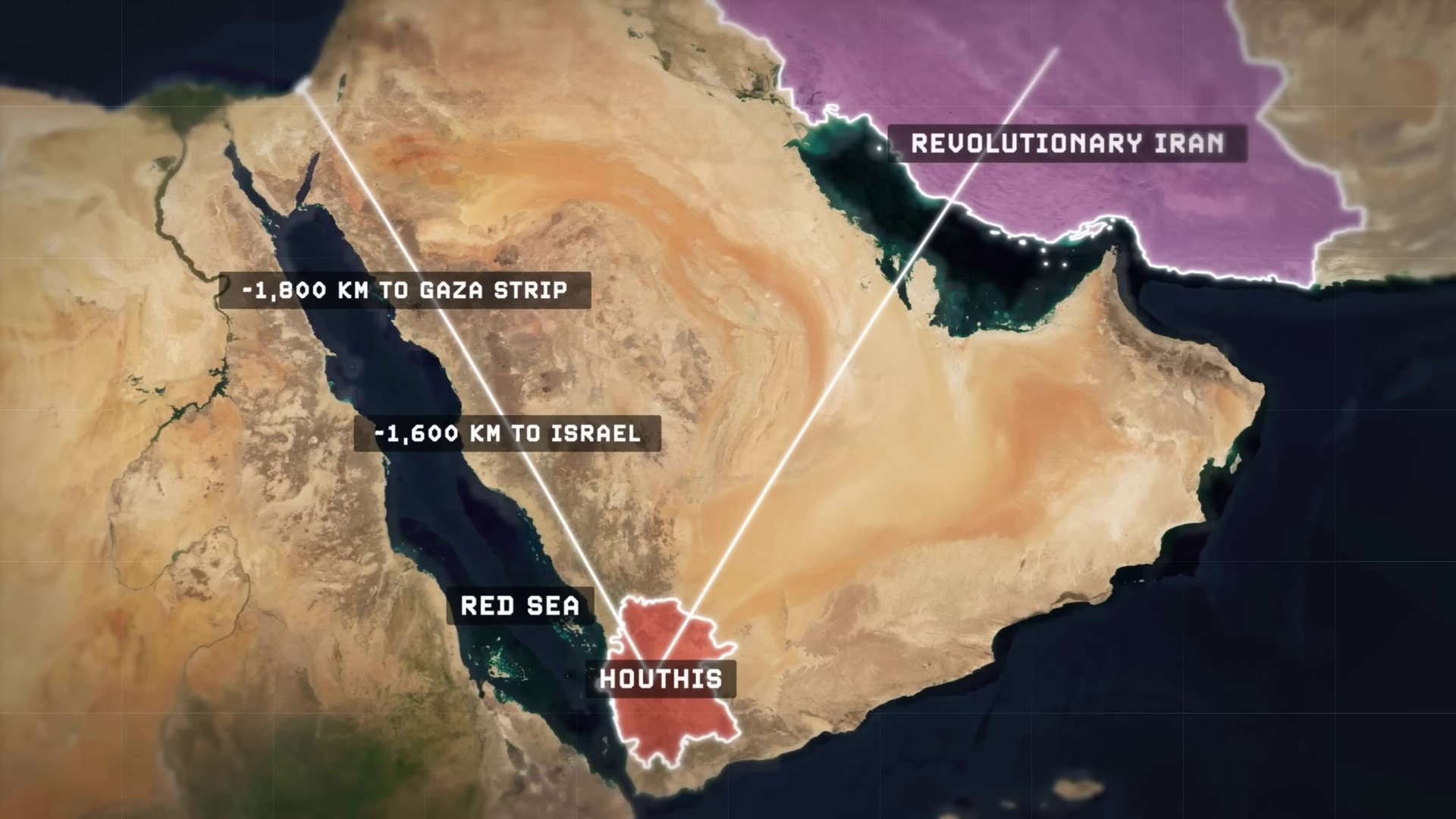
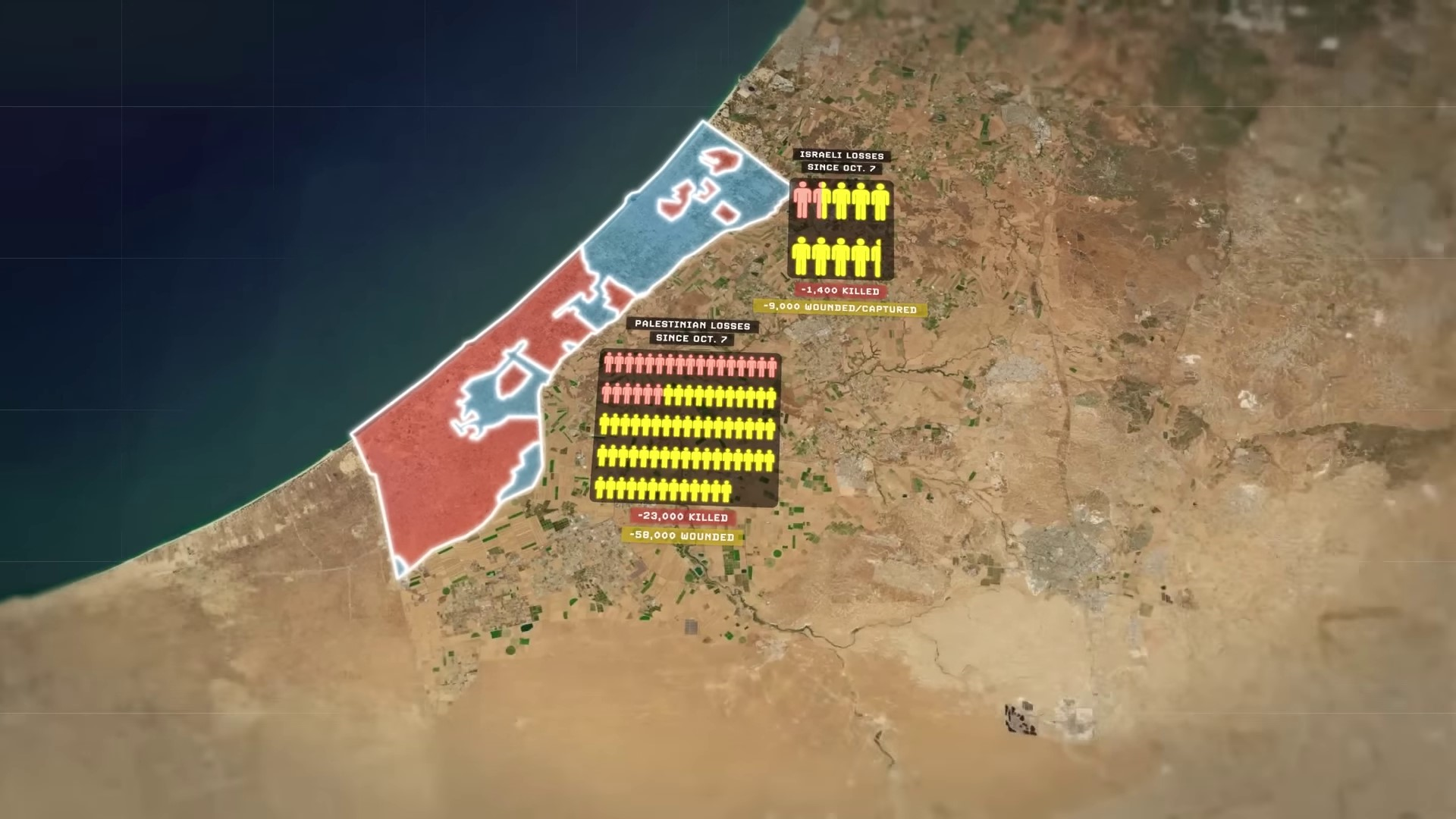
The Red Sea: A Strategic Waterway for Global Trade | 0:01:00-0:06:20
The ownership structure of the globalized 21st-century merchant shipping fleet is a complicated one, making it an arduous task to determine if merchant ships operating on the world's oceans are considered Israeli or not. Nonetheless, this did not deter the Houthis from deciding to intervene by attacking ships they determined to be Israeli. Their attacks commenced on the 19th of November 2023, starting with a bold hijacking of an empty car carrier sailing through the Red Sea. As the carrier voyaged from Turkey to India, the Houthis raided the ship with a helicopter, which transported a heavily-armed special forces squad onto the deck of the ship. They quickly subdued its crew and rerouted the vessel back to Hodeidah, a Houthi-controlled port in Western Yemen.
The hijacked ship, known as Galaxy Leader, was registered under the Isle of Man-based company, Galaxy Maritime Limited. The ship was chartered by a Japanese company, bore the Bahamas' flag of call, and its 25 crew members hailed from the Philippines, Romania, Bulgaria, Ukraine, and Mexico. The only link connecting the ship to Israel was Galaxy Maritime Limited's parent company, Ray Car Carriers. Ray Car Carriers, co-owned by well-known Israeli businessman and billionaire, Abraham Ungar — who has a current net worth of approximately 3.25 billion US dollars — became the reason for the Houthis' attack and subsequent hijacking of the ship. The incident marked the beginning of a string of subsequent attacks and hijackings, as the Houthis hurled hundreds of missiles and drones in the ensuing weeks and months.
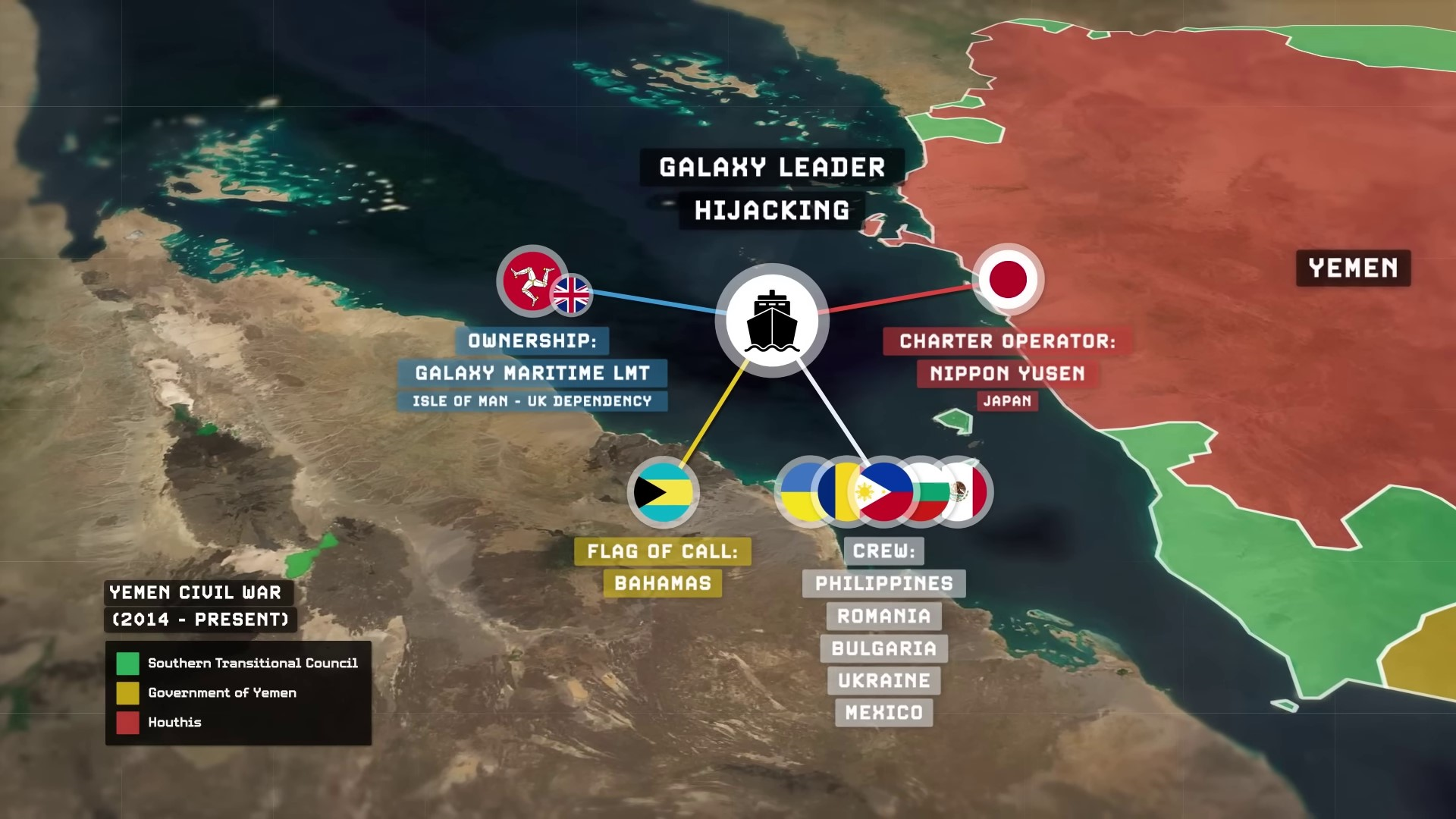
Supported by Iran, the Houthis has arguably become the most dangerous and heavily-armed piracy force in modern history. Boasting a formidable arsenal of guided anti-ship missiles and kamikaze drones, the group's power surpasses that of pirates previously launching from Somalia and raiding commercial shipping in the Arabian Sea. Geography further bolsters their advantage, enabling them to wreak havoc on the global economy. The Houthis currently control the northwestern third of Yemen's territory, including its population and coastline along the Red Sea — a crucial passageway for global trade routes between Asia and Europe. Significant choke points like the Bab al-Mandeb Strait and the Suez Canal regulate access to this waterway, which handles a large portion of global container ship traffic, as well as oil and LNG shipments. Maintaining security in the Red Sea is essential for many countries, including Russia, which depends on it for exporting oil and LNG to China and India.
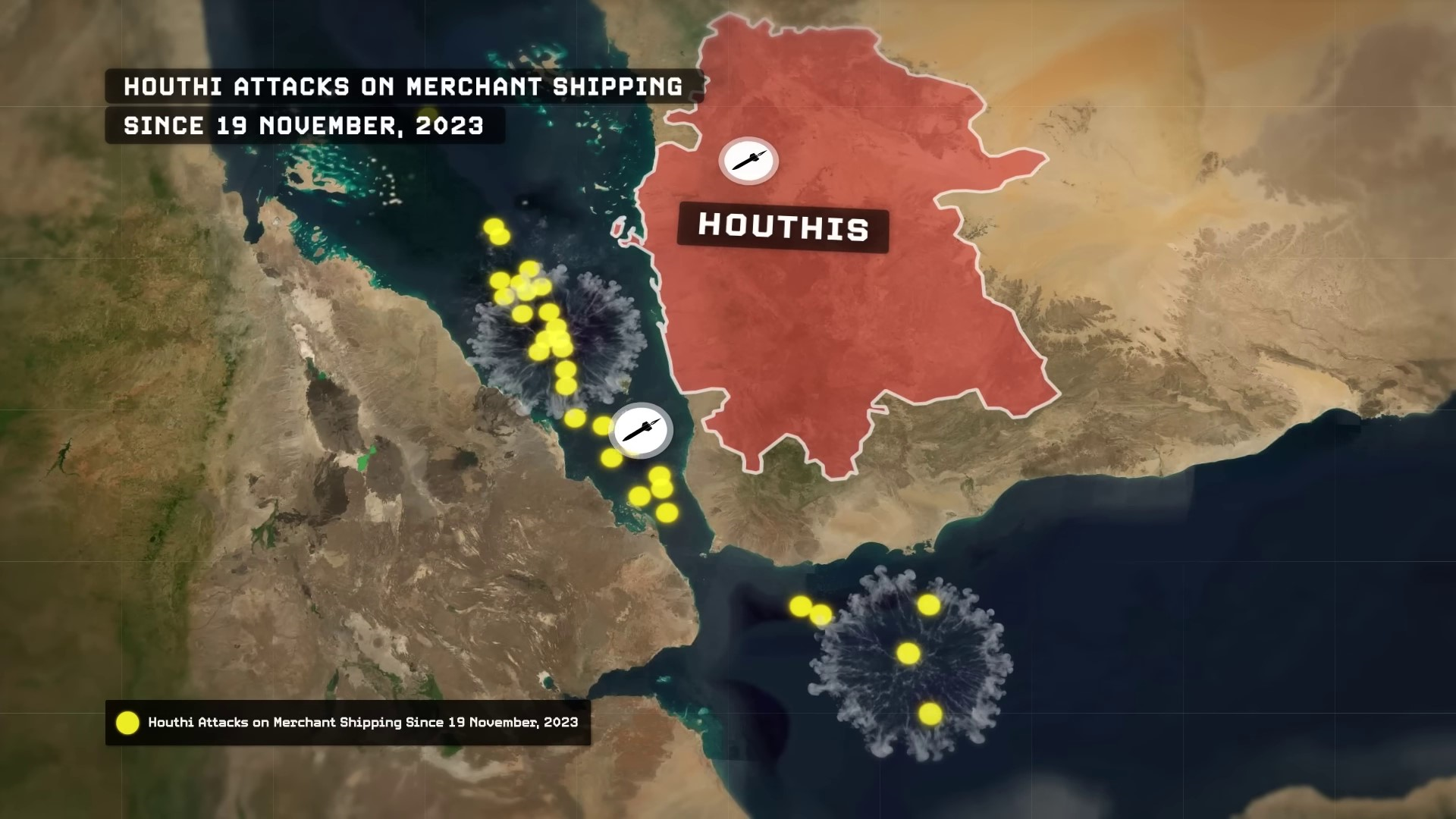
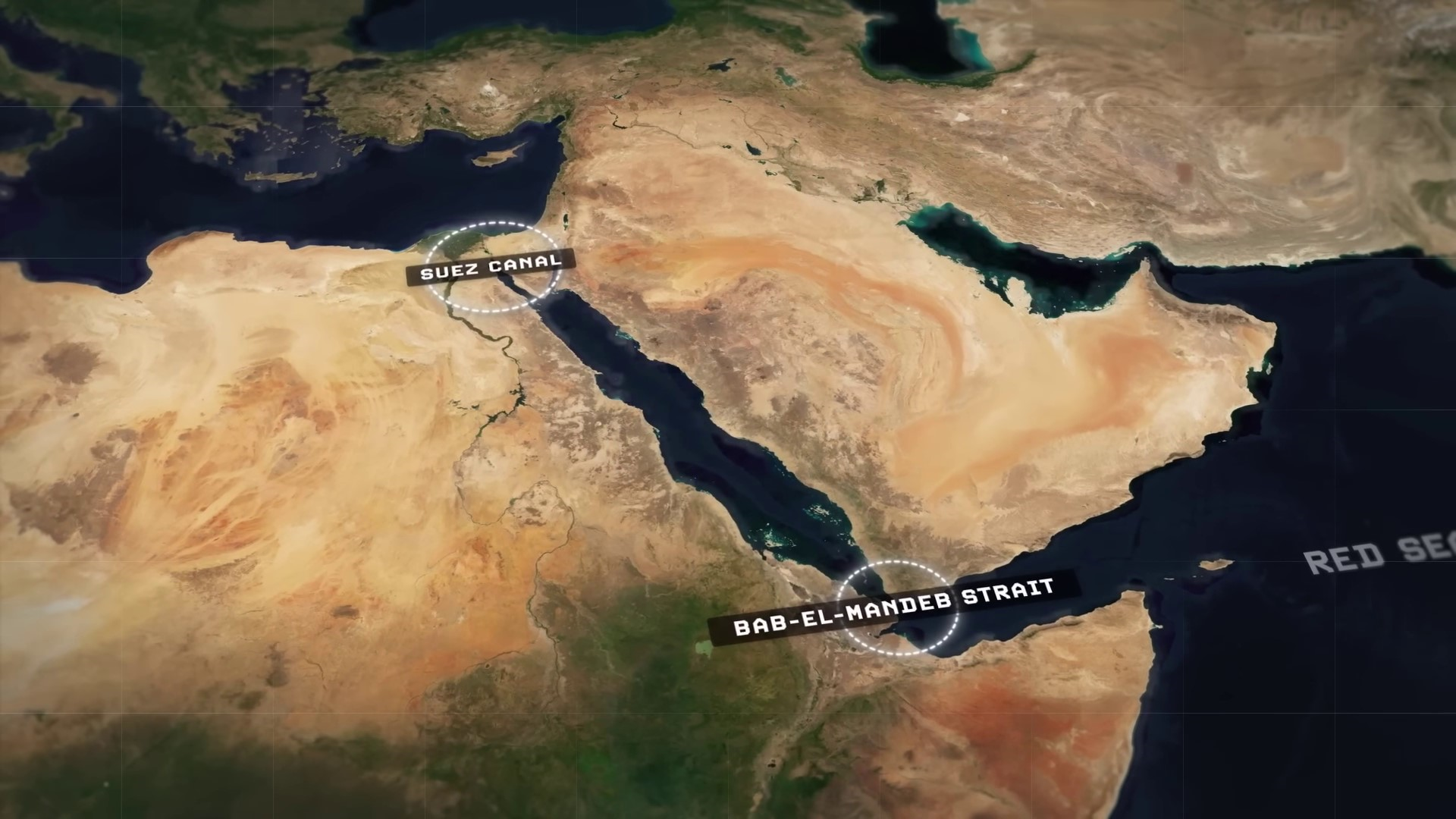
Kazakhstan and Azerbaijan rely on the route to a lesser extent for their own oil exports. From China's perspective, the Red Sea is vital for receiving energy resources from Russia and transporting manufactured products to Europe. The European Union uses the Red Sea as a primary trade route to export crude oil to Europe.
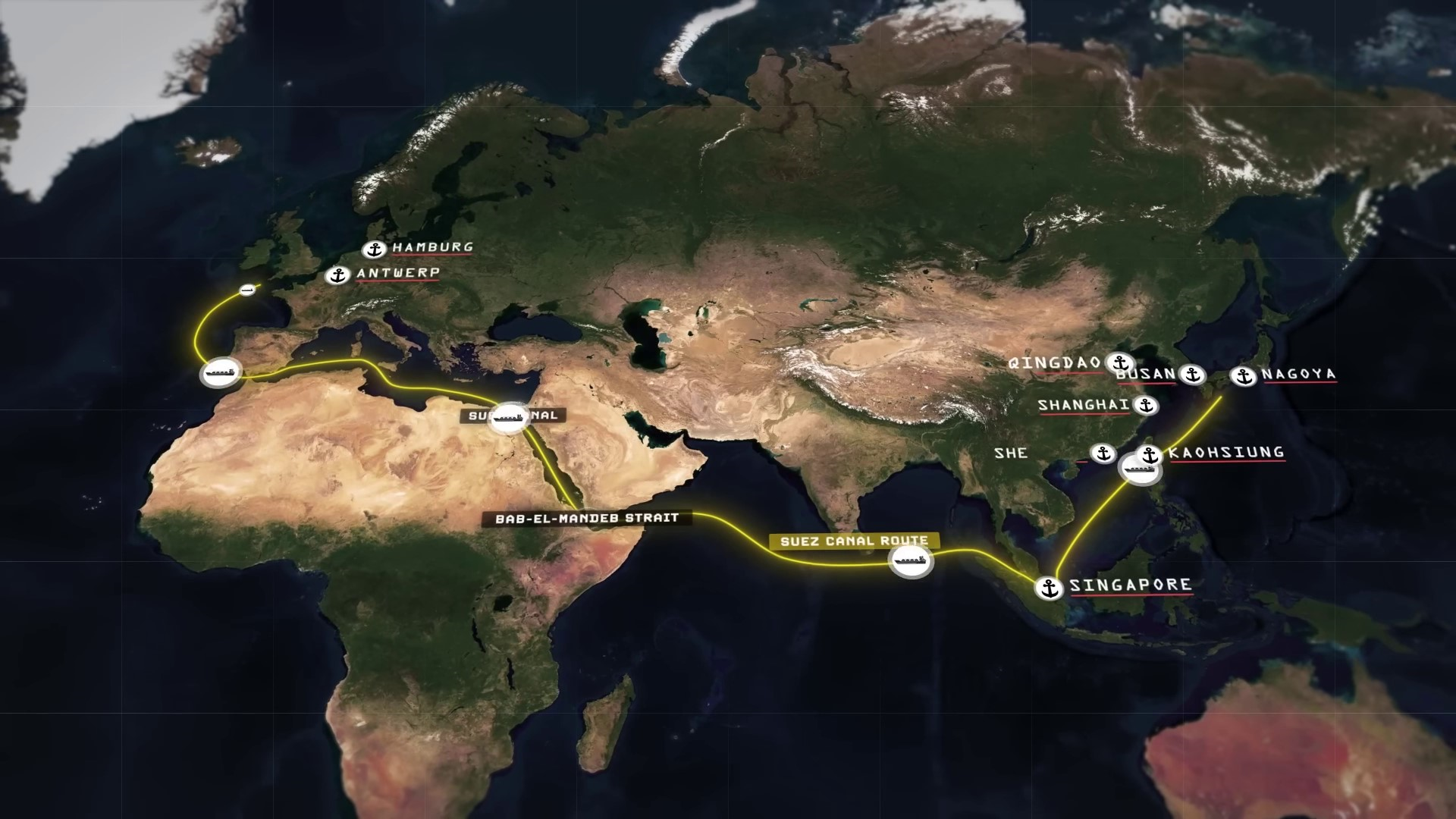
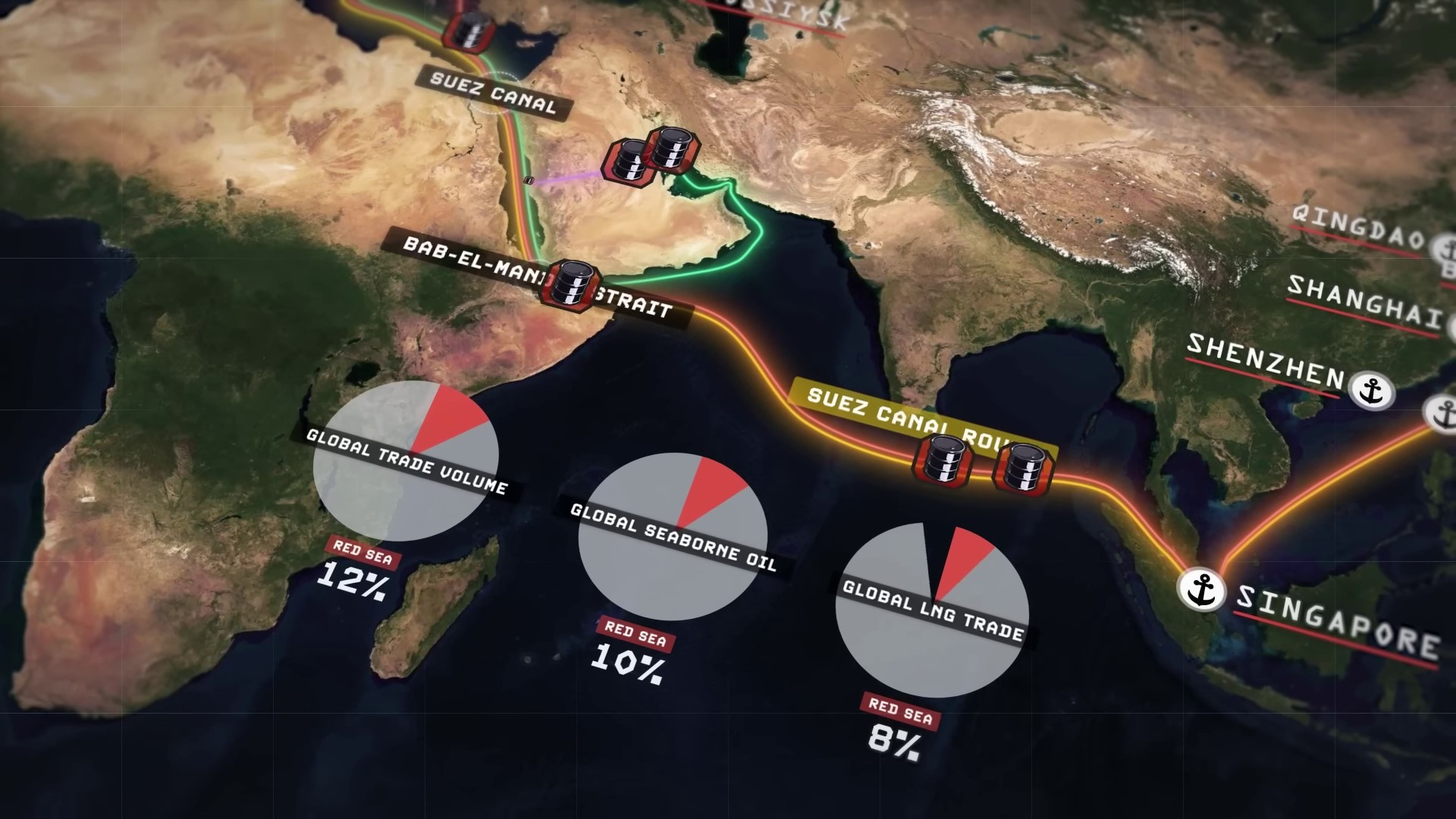
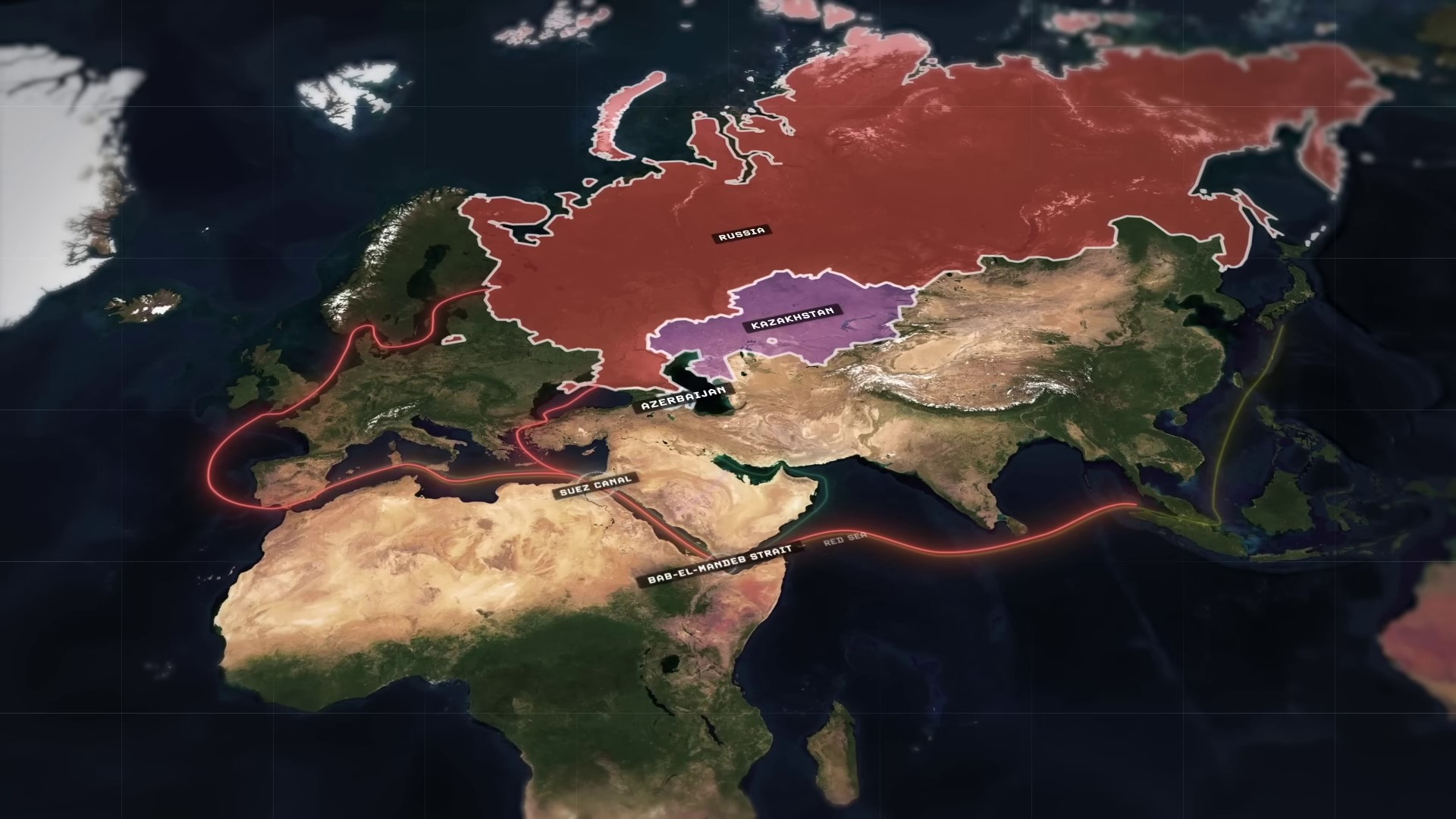
The Importance of the Red Sea and Suez Canal for Global Trade | 0:06:20-0:11:20
The Red Sea is a crucial trade route for receiving manufactured goods from Asia and energy resources from the Persian Gulf. Washington aims to ensure the continuous flow of maritime trade through the Red Sea to support the global economy.
Egypt, as the controller of the Suez Canal, greatly benefits from this smooth trade flow and charges fees on ships passing through. The Suez Canal provides a shorter route between Asia and Europe than sailing around Africa, generating significant revenue for Egypt. In the fiscal year between June 2021 and June 2022, a record number of ships passed through the Suez Canal. This resulted in all-time high annual revenue of 9.4 billion US dollars for Egypt.
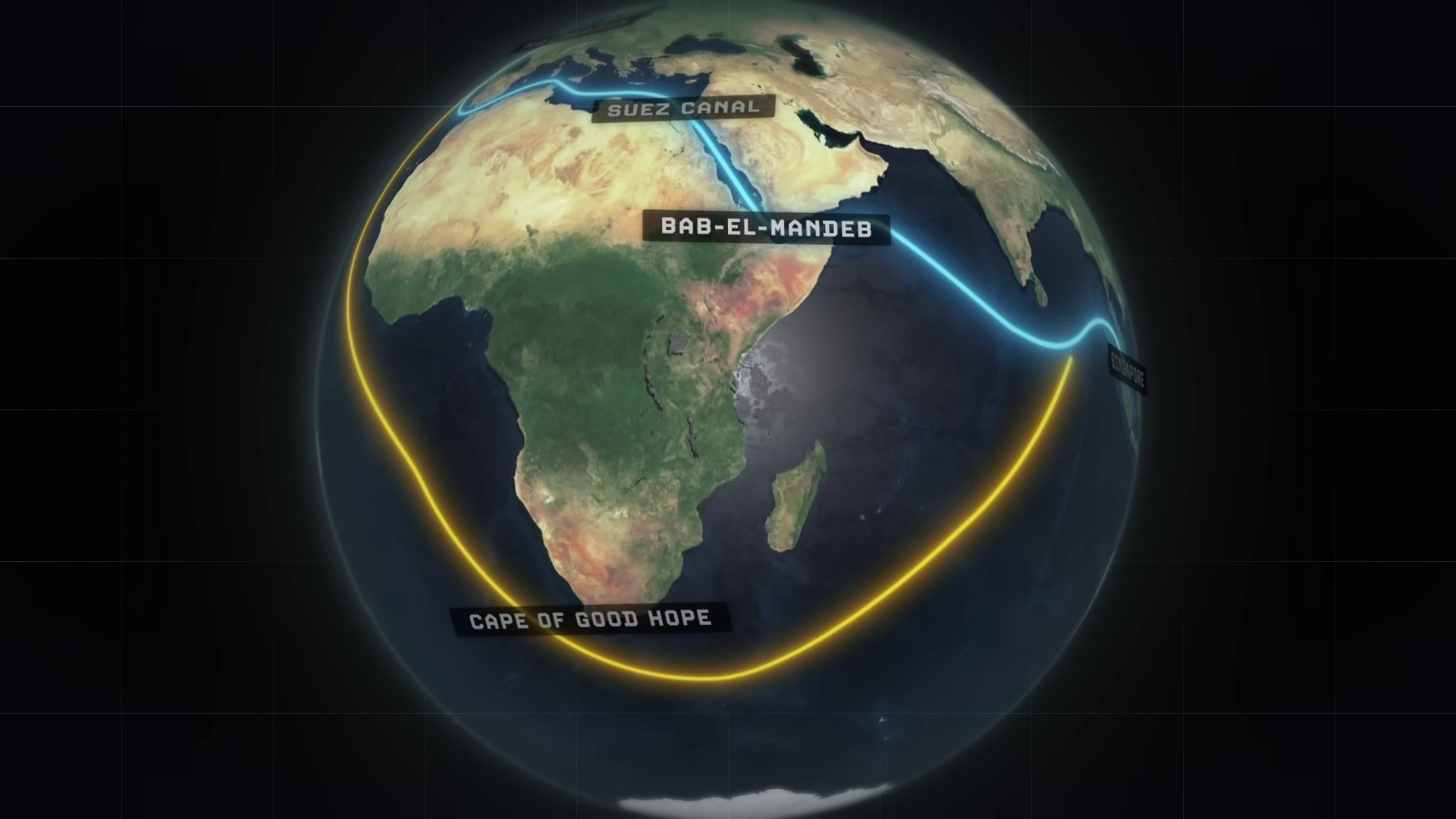
Sudan and Eritrea are located right on the Red Sea, whereas Djibouti's port, close to the Red Sea in the Gulf of Aden, currently supports approximately 95% of landlocked Ethiopia's trade volume.
Hence, the safe, secure, and reliable flow of trade through the Red Sea is extremely important to many countries worldwide. Unfortunately, the Red Sea is situated in one of the most geopolitically turbulent regions, with ships being most vulnerable when transiting through its narrow gateways. In the event of an intentional blockade or accidental obstacle, like those experienced in the past at the Suez Canal to the North and the Bab-el-Mandeb Strait to the South, global trade can come to a complete halt.
There have been two notable instances in recent history. The first was an 8-year period from 1967 to 1975 during the Arab-Israeli wars, when Israel took control of the Sinai Peninsula, effectively shutting down the Suez Canal. The second, more recent instance occurred in 2021 when the container ship Ever Given was caught in a sandstorm and crashed, blocking the canal's entire width for nearly a week. This event impeded trade between Europe, Asia, and the Middle East. Ships carrying approximately 10 billion U.S. dollars worth of goods were bottlenecked, prompting many to reroute around Africa.
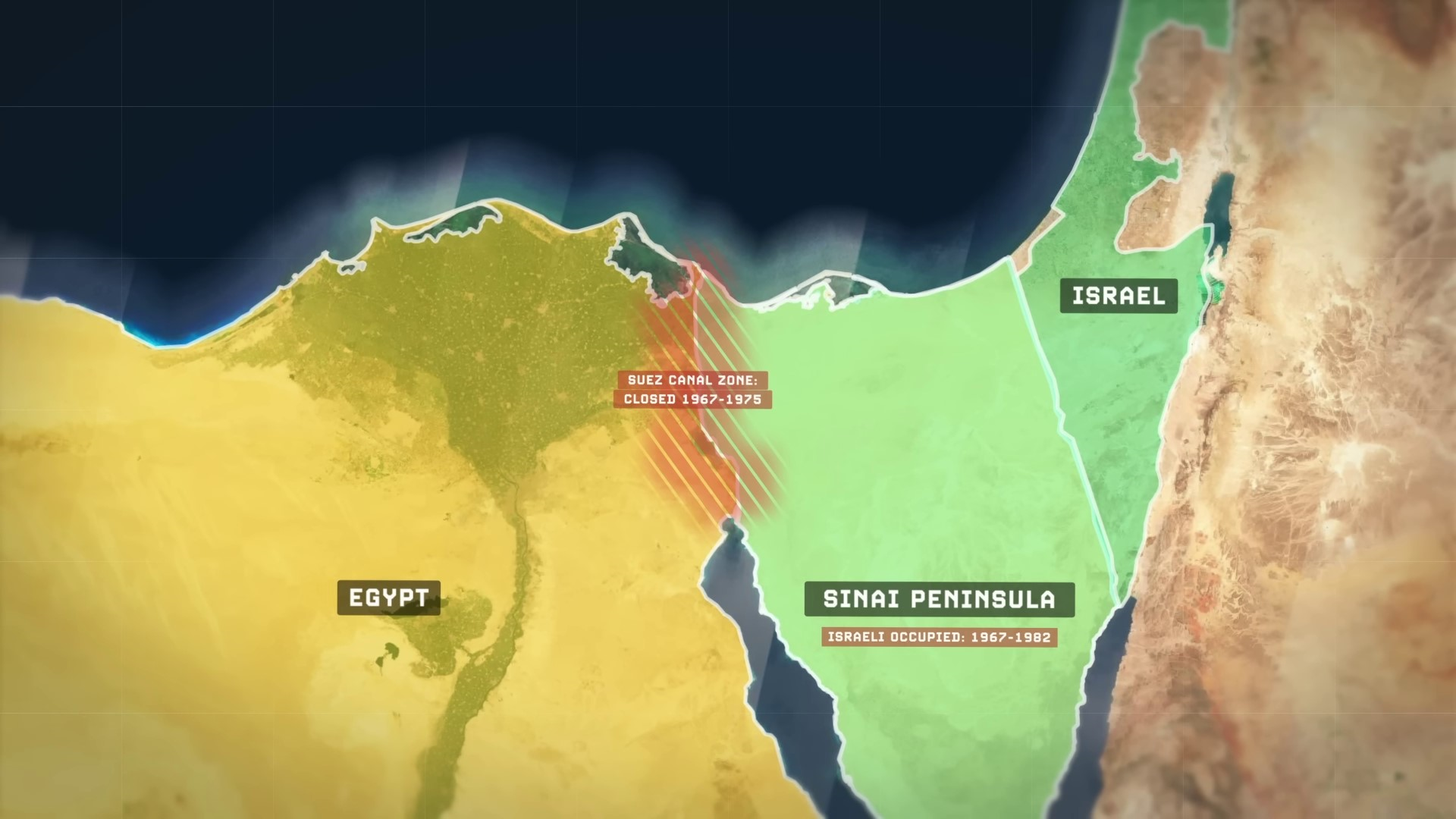
On the Red Sea's other side, the Bab El-Mandeb Strait, which is only 23 kilometers wide, is situated in a volatile region where violent civil wars rage in Yemen, Sudan, Somalia, Ethiopia, and Eritrea, where Eritrea is ruled by a ruthless dictatorship often compared with North Korea.
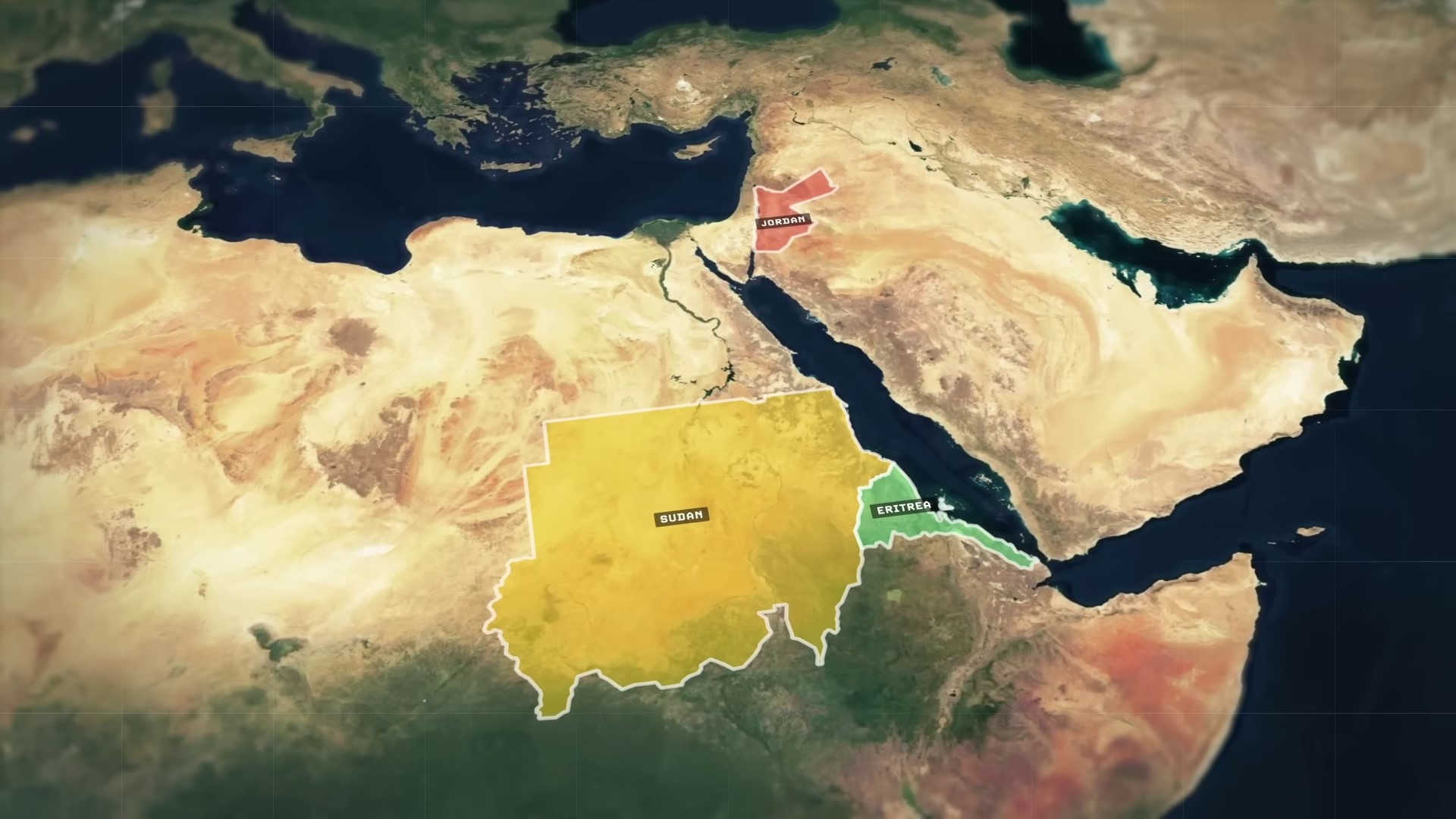
However, Djibouti exists as an island of stability amid this chaos, which is why foreign countries maintain significant military bases there to protect their national interests. China, Japan, the United States, France, Italy, and soon likely Saudi Arabia, all have presence there. The United Arab Emirates even maintains a base nearby in the self-declared state of Somaliland, while Russia seeks to secure a former UAE military base in Eritrea, directly adjacent to the Strait.
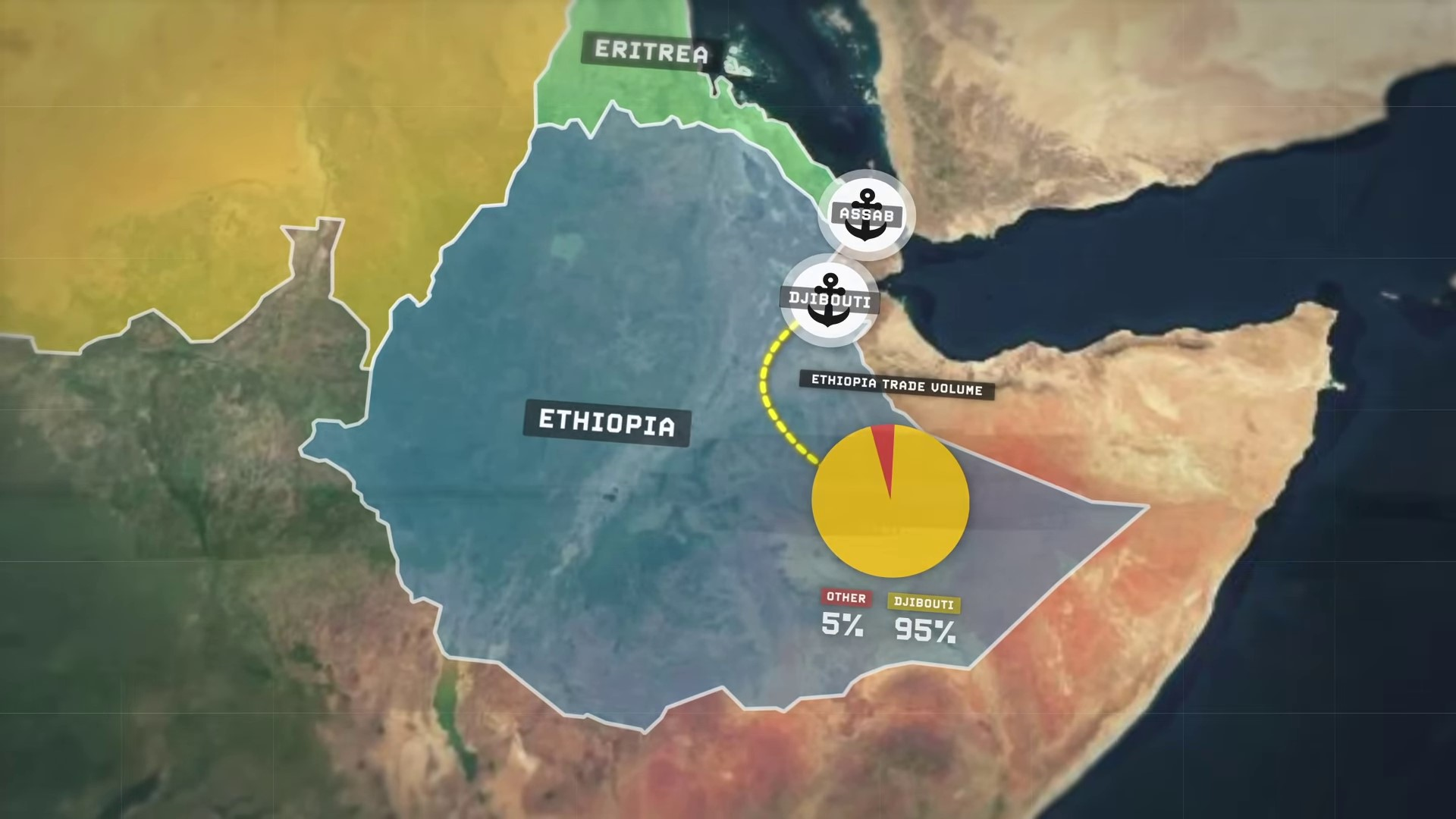
For years, the biggest threat to shipping through the Bab el-Mendeb Strait were Somali pirates, who raided merchant vessels primarily for money, hostages, and ransoms in the Gulf of Aden and the Arabian Sea. This threat persisted into the 2010s, until it began subsiding after 2017 due to the increased effectiveness of maritime patrols and escort missions conducted by American, UK, French, Russian, and Chinese navies, and other international forces, deterring the pirates from further disruptive attacks.
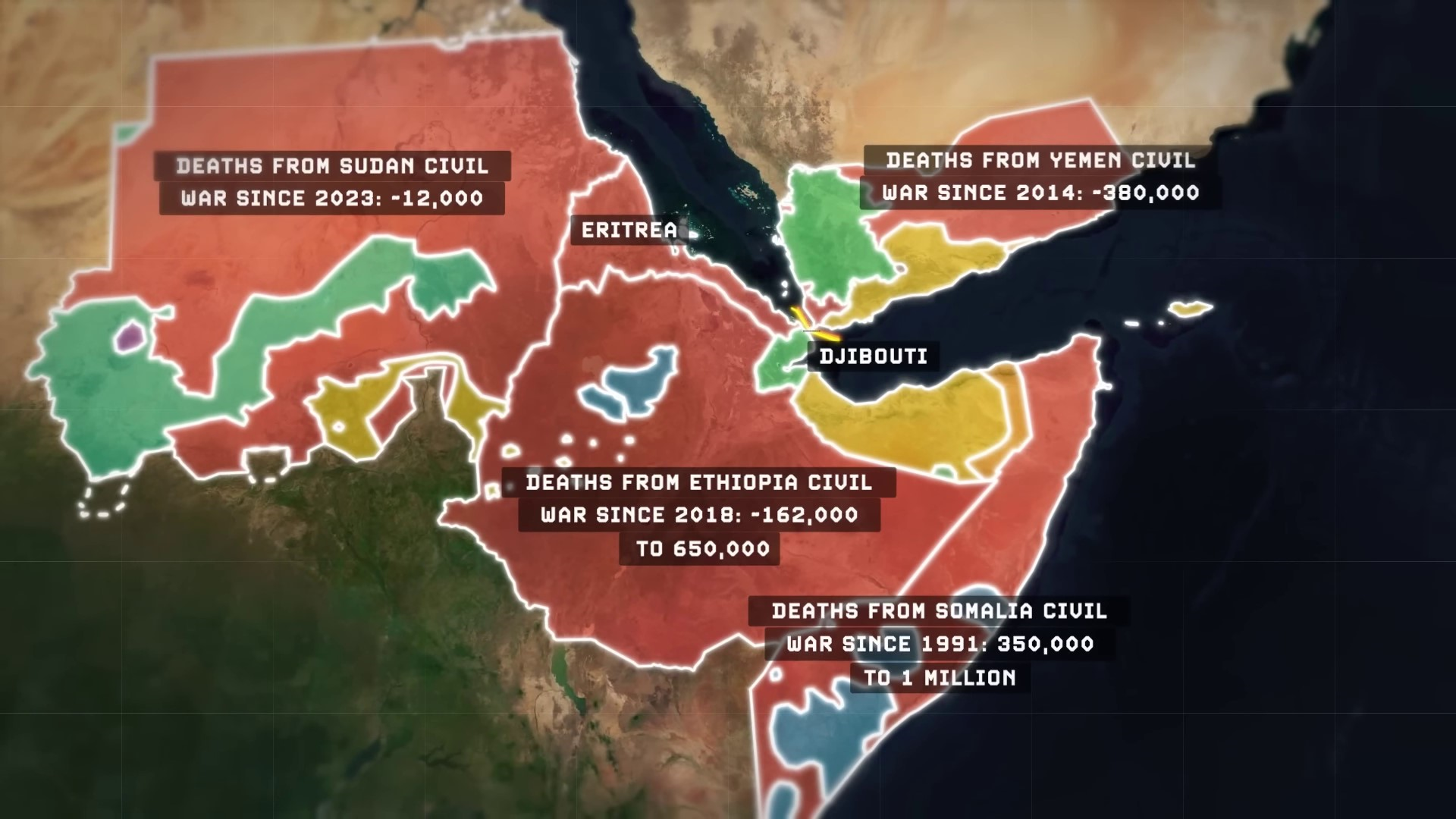
International Navies' Role in Red Sea Security | 0:11:20-0:18:00
The Houthis in Yemen are now the ones launching dozens of attacks on this critical global trade artery, and it has already severely affected the worldwide economy. The Houthi movement, officially known as Ansar Allah, translating to "Defenders of God", arose from Yemen's Zaydi Shia Muslim community. This community comprises approximately a quarter of Yemen's overall population and is indigenous to the hills and mountains of Yemen's northwest, situated directly opposite Saudi Arabia's predominantly Shia Muslim community across the border.
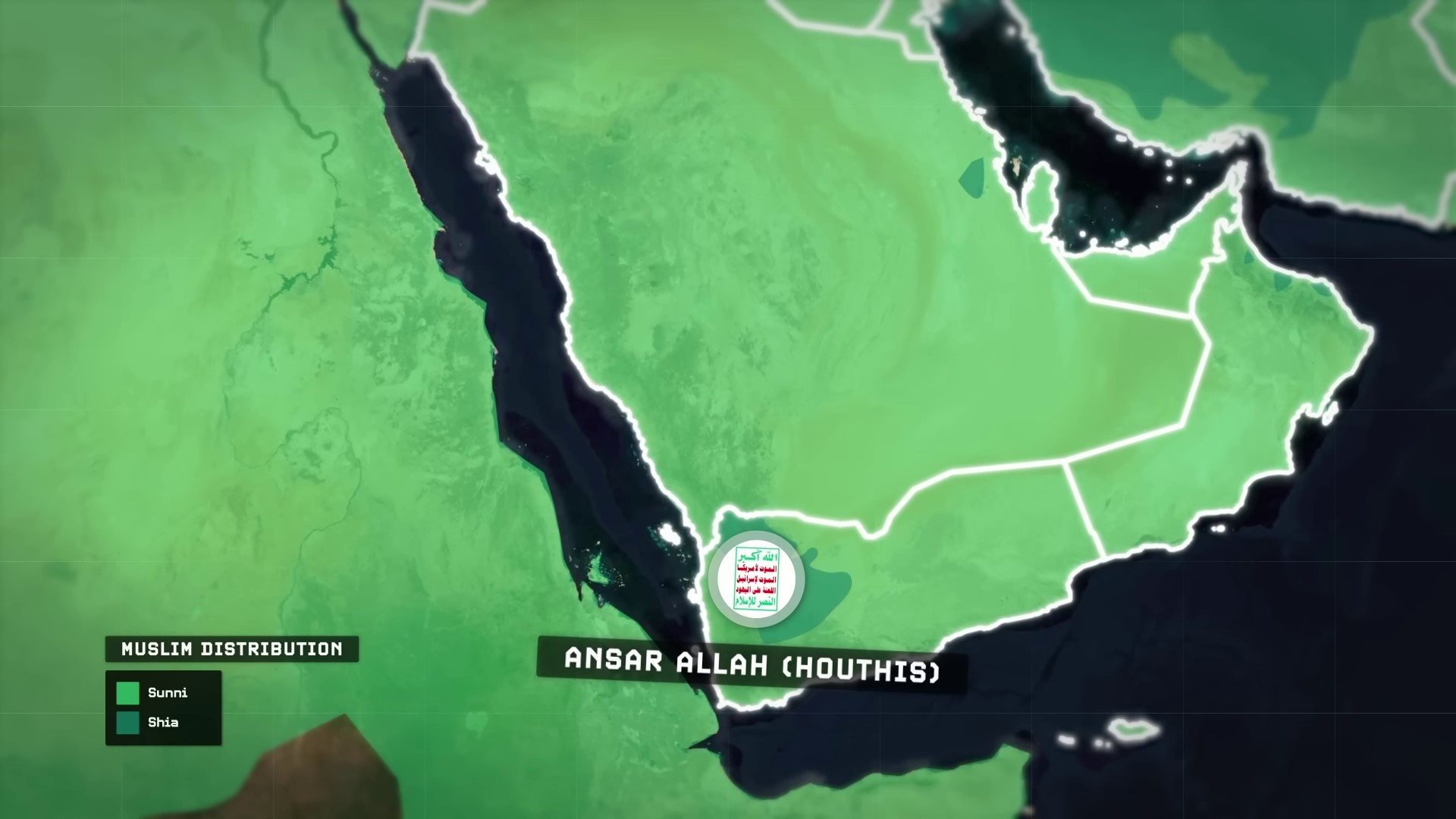
Formed with resistance to the United States, Israel, and the Saudi monarchy's influence in the Middle East in mind, the Houthis sought closer relations with Iran. Their official motto and flag have left no doubt about their political and ideological stance. It hails from the Yemeni capital, Sanaa.
From Sanaa, the Houthis expanded their territorial control further across Northwestern Yemen, while the then president of Yemen fled to Saudi Arabia. Upon his request for foreign intervention to restore his authority and quash the Houthi rebellion, Saudi Arabia decided to intervene militarily in Yemen. If Yemen or Iran were to blockade the Strait of Hormuz, Saudi Arabia's economy, which heavily relies on exporting their crude oil to Asian customers, would instantly crash.
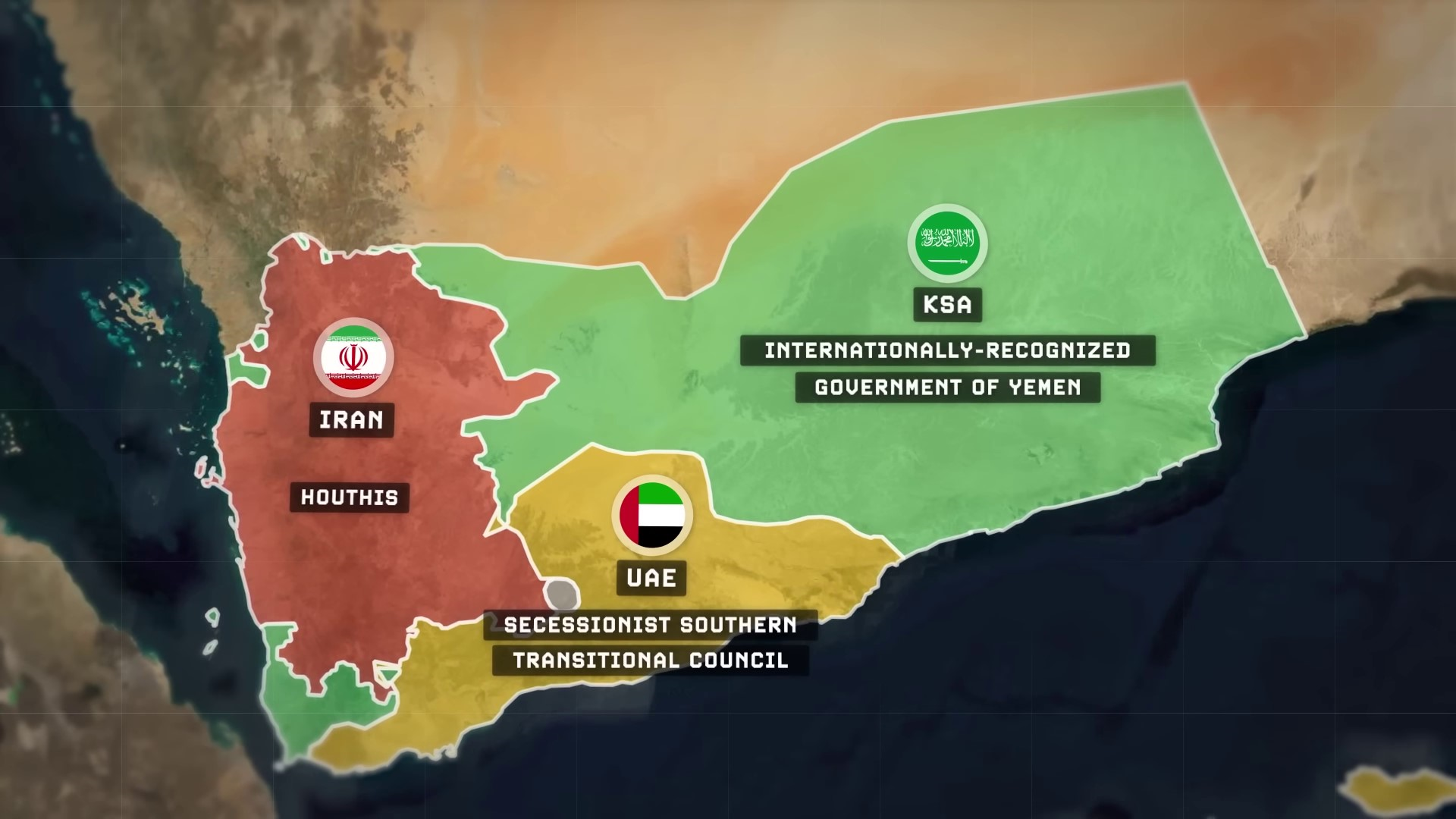
If both chokepoints were closed, the Saudis would be compelled to sell their oil by exporting it northward through the Suez Canal and around Africa. This would make their oil significantly more expensive for Asian consumers, rendering Saudi oil far less competitive, which could devastate Saudi Arabia's finances and government.
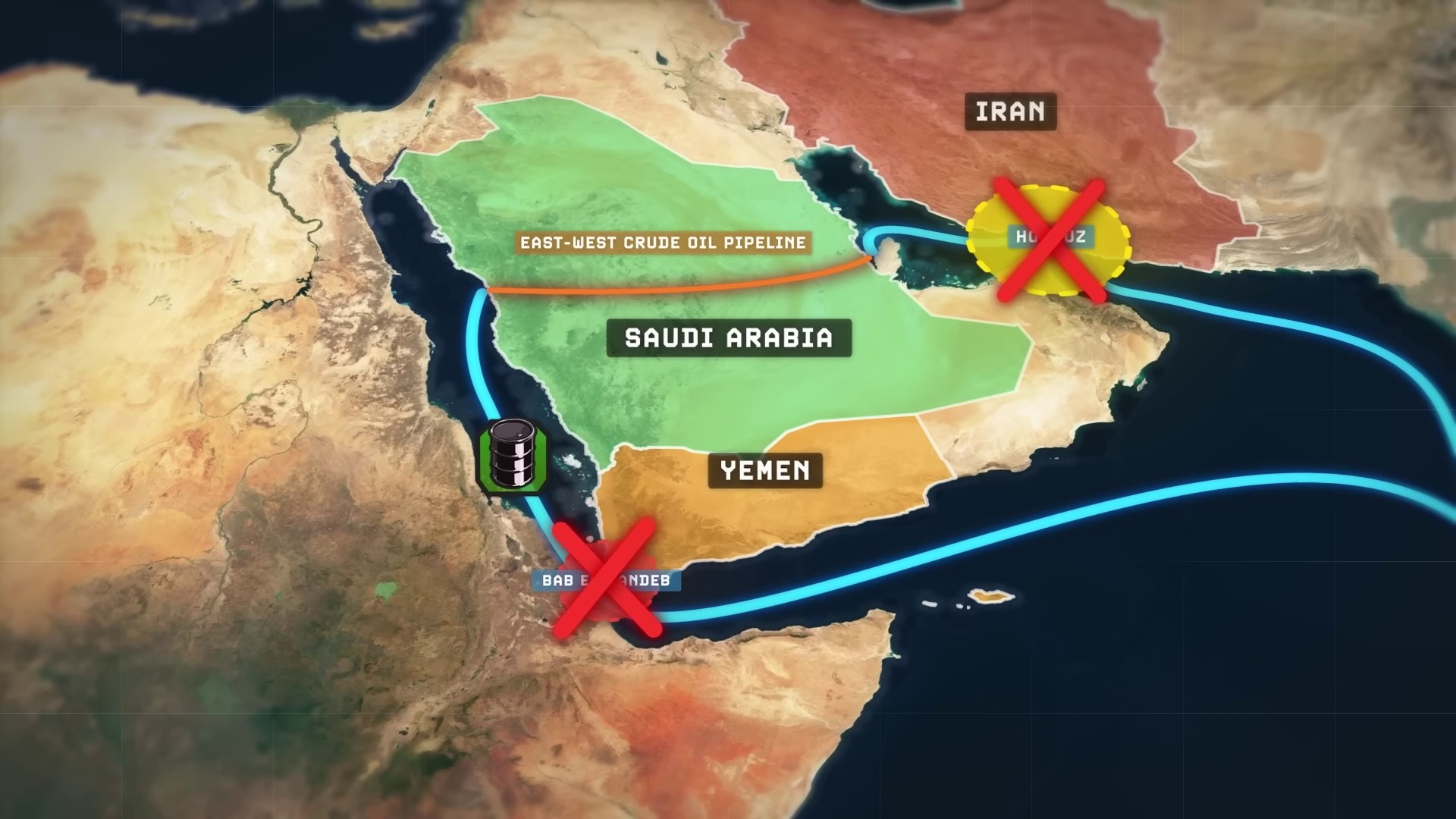
Despite thousands of casualties resulting from war-induced violence, famine, and disease, the Houthis, continually funded and armed by Iran, have remained in power in the territory they control. They resisted the Saudis and their coalition and even retaliated by firing missiles and drones into Saudi and UAE population centers, killing hundreds.
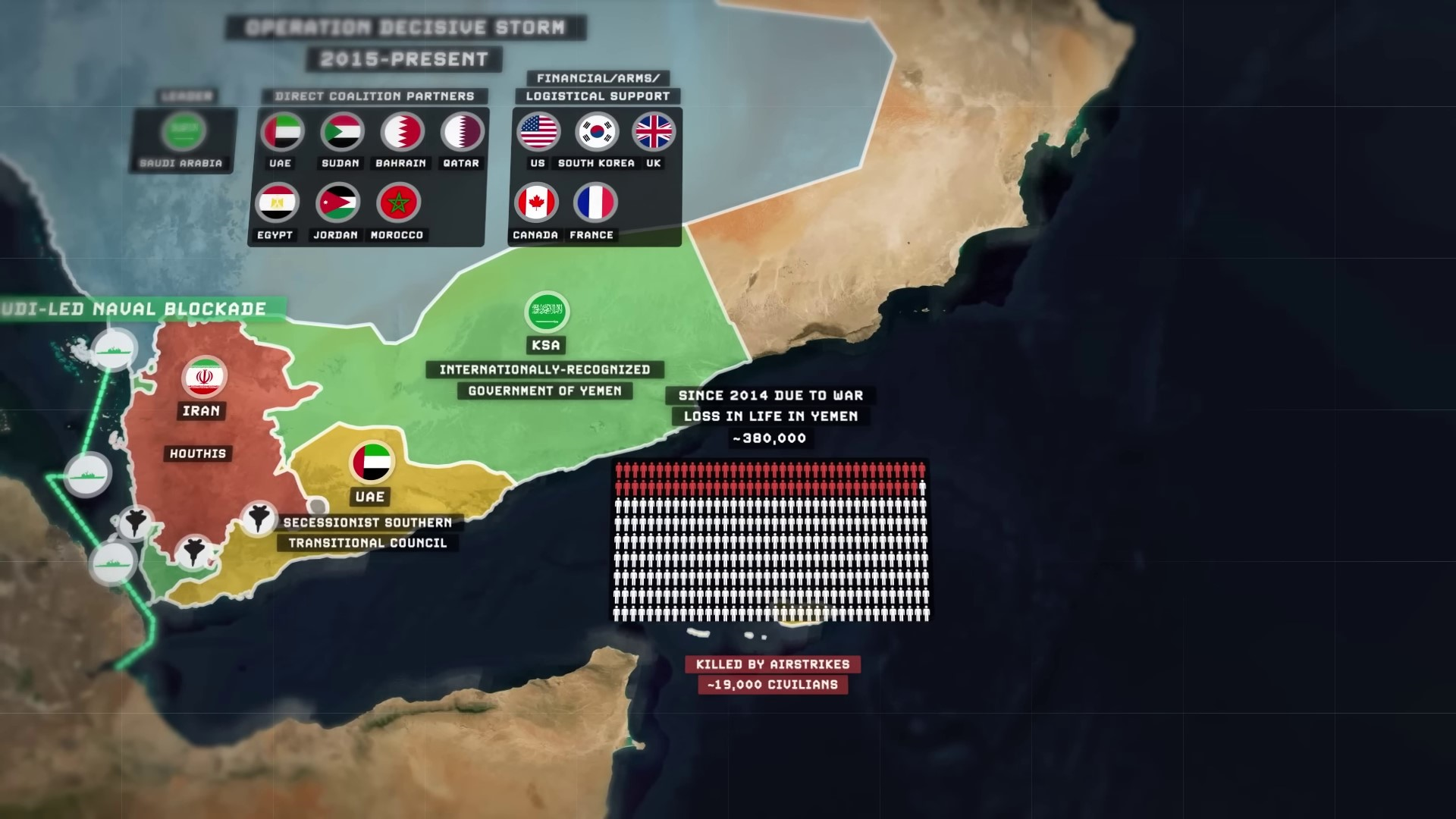
When Donald Trump assumed the American presidency in 2017, he opted to significantly enhance Washington's support for the Saudi war effort in Yemen. This decision fell in line with his overall policy of maximum pressure on Iran and its proxy forces across the Middle East.
He had the Houthis added to America's list of designated terrorist organizations and authorized a deal for additional US arms sales to Saudi Arabia worth over $27 billion. However, as the intervention in Yemen became increasingly bloody, America's continued support for the Saudi war effort there became increasingly politically controversial in Washington.
Joe Biden vowed that after assuming the presidency in 2021, he would completely reverse Trump's course in Yemen. He finally declared in February 2021 that America would halt all its support for Saudi Arabia in Yemen and remove the Houthis from America's list of designated terror organizations.
The sudden cessation of America's support for the Yemen war under Biden, coupled with the Saudis' estimated $265 billion expenditure on failed armament attempts to destroy the Houthis, compelled the Saudis to find an exit strategy for their war in Yemen.
A ceasefire agreement between the Houthis and the Saudi-backed Yemeni government was struck in April 2022. It has generally been upheld since, with only minor flare-ups of violence as negotiations between the Saudis and the Houthis for a final peace settlement continue.
This relative calm in Yemen since the April 2022 ceasefire has allowed the Houthis to consolidate their control over the region they govern in northwestern Yemen. This area represents only about a quarter of Yemen's total territory but comprises more than two-thirds of Yemen's total population, approximately 24 million people, and includes Yemen's capital city.
The Houthis thus control more of what makes Yemen, Yemen than the internationally recognized government does. This was brought to light profoundly in December 2023 by the increasing and increasingly indiscriminate attacks after the Galaxy Leader hijacking incident. The wartime risk insurance premiums that maritime insurance companies charge for all ships sailing through the Red Sea began to skyrocket.
Impact of Maritime Operations Suspension on Global Shipping and Inflation | 0:18:00-0:22:00
Major shipping companies from around the world, faced with rapidly increasing insurance premiums to cover their ships and cargoes operating in the Red Sea, promptly began to announce the suspension of all their maritime operations through the Red Sea and the Suez Canal. These decisions were motivated by the very real risk of their expensive ships getting damaged, their cargoes getting ruined, or their crew members being injured or killed. Most of the world's largest container shipping companies, like Maersk, MSC, Evergreen, CMA, CGM, Hapag-Lloyd, and Costco, have now announced these suspensions. Together, these companies represent over 95% of all the container volume that usually travels through the Suez Canal. Many major oil and gas companies, including BP and the Norwegian state-owned oil company Equinor, have also indefinitely suspended sending oil and gas tankers through the Red Sea or the Suez Canal.
As a result, the world finds itself facing a third Suez crisis, after those of 1967, 1975, and 2021. By the end of December 2023, more than 300 container ships and numerous tankers had diverted their routes. Crews on these vessels were rotated out more frequently and paid for longer hours, contributing to the cost of the Cape of Good Hope route being around 15% more expensive than the shorter Red Sea and Suez Canal route. This cost accounts for the tolls and fees charged by Egypt. Consequently, as more ships divert from the Red Sea, the 15% higher average shipping cost is being gradually passed on to consumers.
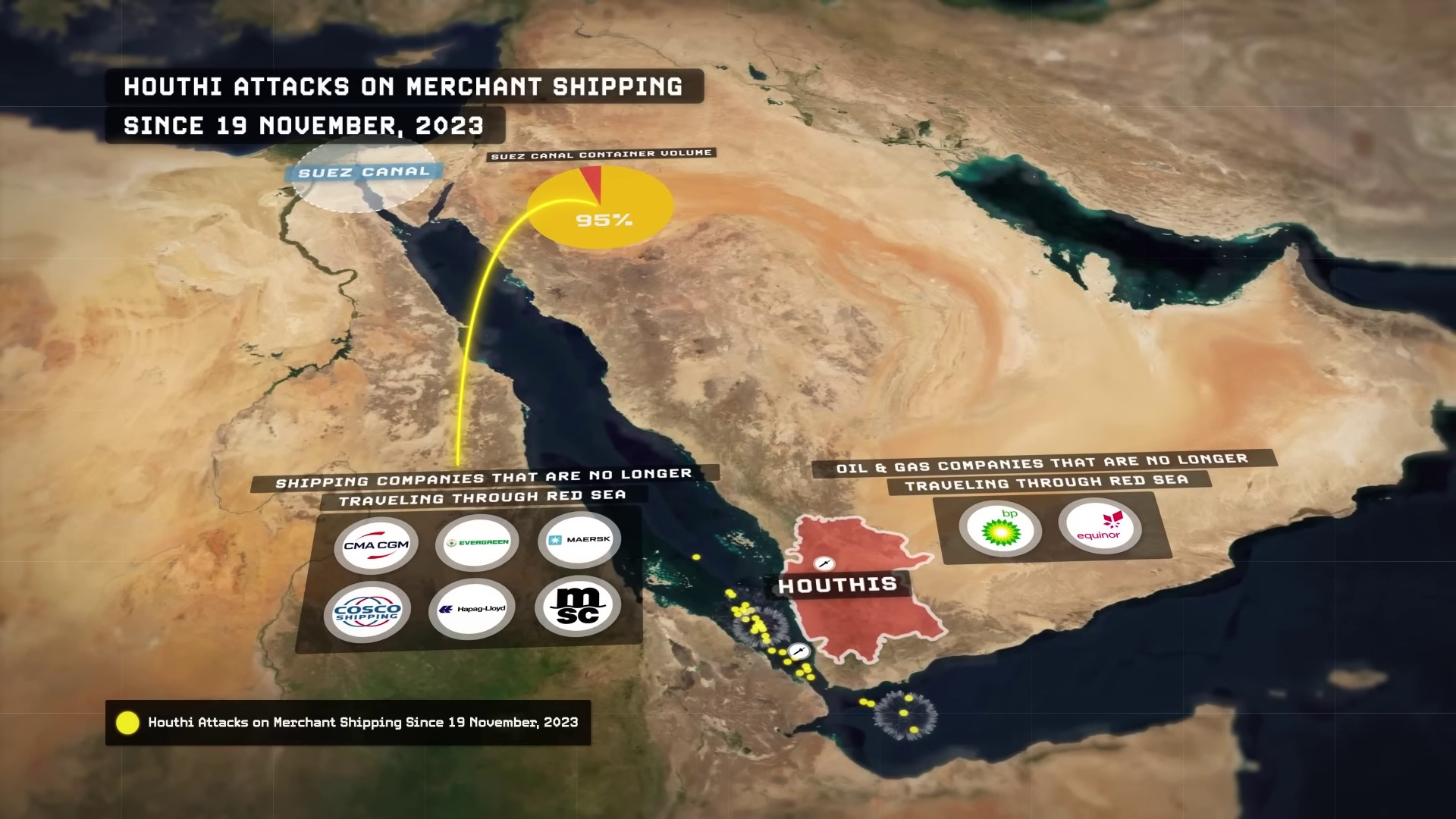
The extended time these ships spend at sea, traveling longer routes between Europe and Asia, is expected to absorb around 20% of the entire global merchant fleet's capacity. This is anticipated to lead to even more shipping delays and higher costs, causing a worldwide surge in inflation for nearly every product.
Moreover, there are many secondary effects that might compound the situation as long as the closure of the Red Sea to international shipping persists. For instance, the Houthi attacks have impacted Israel by completely shutting down the southern Israeli port of Eilat, its only non-Mediterranean port on the Red Sea. However, Eilat is relatively minor from Israel's perspective as it handles only 5% of Israel's total maritime trade. Israel's larger Mediterranean ports of Ashdod and Haifa process the majority of trade and remain operational. Nonetheless, the cost of Israeli imports is on the rise due to these complications.
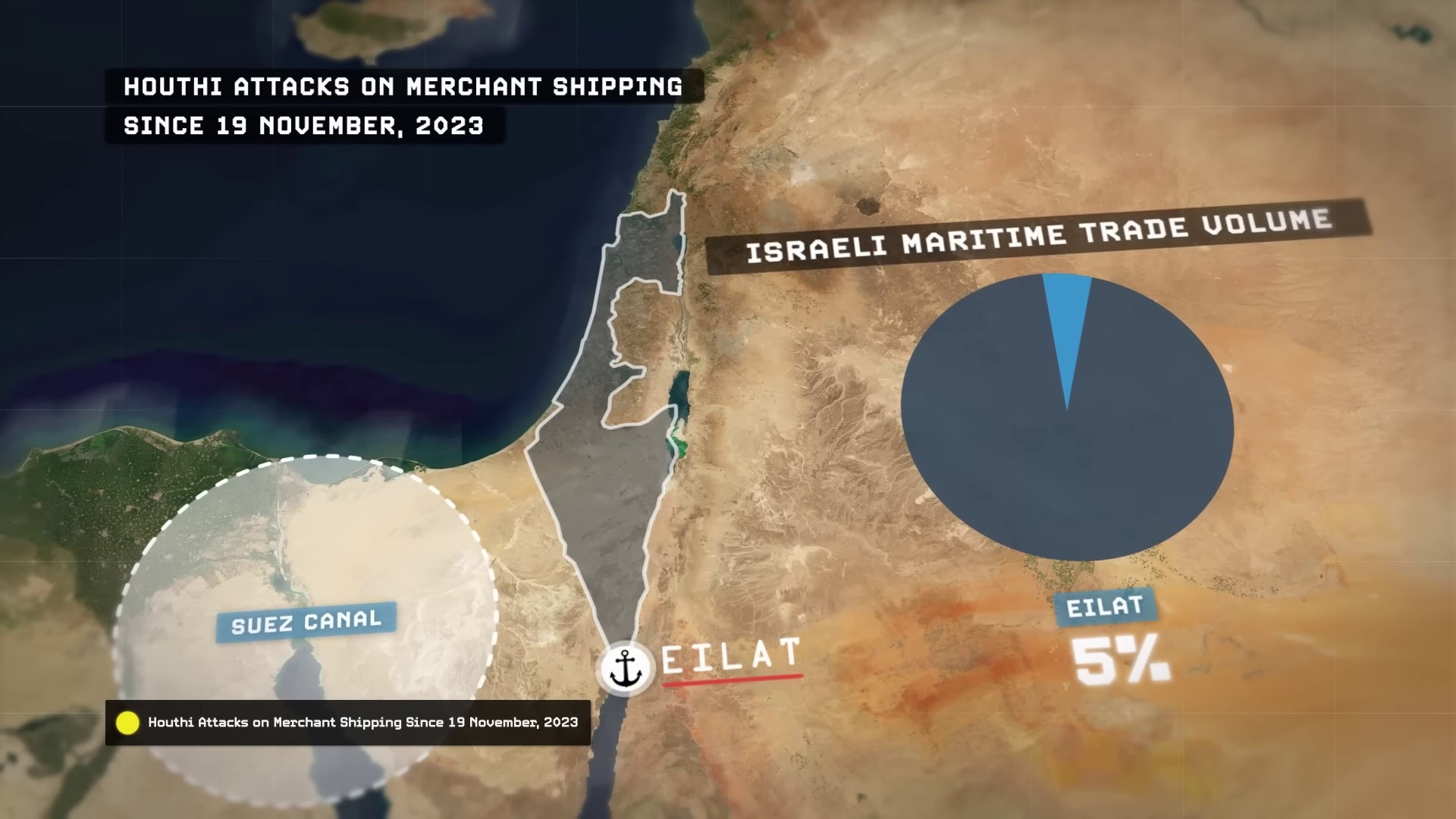
Creation of Operation Prosperity Guardian | 0:22:00-0:25:00
The situation in the Red Sea involving the Houthis is causing global disruption as merchant shipping is being targeted. This is resulting in increased costs for products, raw materials, and energy resources as well as contributing to global inflation. Iran and the Houthis are potentially hoping to pressure Israel through these attacks. However, Israel remains resolute in its war objectives against Hamas, seeking its complete dismantle. The conflict is predicted to persist for several more months, with continuous attacks on merchant shipping in the Red Sea.
On December 18th, the United States disclosed the foundation of a new international military coalition named Operation Prosperity Guardian. This coalition aims to defend all merchant ships in the Red Sea and Israeli ports from Houthi missile and drone assaults. So far, the operation has been strictly limited to intercepting Houthi missiles and drones flying over the Red Sea and safely escorting merchant ships through the Red Sea with warships, without directly attacking the Houthis in Yemen. The United States has committed one of its own aircraft carriers to this operation in the Red Sea, along with four of its destroyers. Likewise, the British have committed one of their own destroyers, and both Denmark and Greece have agreed to send a frigate each. The French and Italian navies, though not part of the operation, have deployed their own frigates to operate independently in the Red Sea. Other countries have nominally signed on to the operation, but with extremely minimal commitments compared to the Americans, British, Danes, and Greeks. Greek ships operating within the Red Sea have already shot down dozens of Houthi drones and missiles fired at merchant vessels.
Maersk and Hapag-Lloyd Resume Shipping Operations, Disaster Strikes Again | 0:25:00-0:27:40
Encouraged by the progress, both Maersk and Hapag-Lloyd cautiously announced on the 24th of December that they would begin resuming their shipping operations through the Red Sea and the Suez Canal. However, disaster struck again just nine days later. On the 2nd of January 2024, a Maersk container ship traveling through the Red Sea was struck by a Houthi missile. Following this attack, four small Houthi ships sailed towards them and attempted a hijacking. The Maersk ship radioed a distress call to which the US aircraft carrier in the region responded by dispatching helicopter gunships to intercept the Houthi pirates.
Upon arrival, the American helicopters opened fire on the Houthi boats, sinking three of them and killing ten Houthi pirates on board. This marked the first time that the Americans and the Houthis engaged directly in combat. The same day, both Maersk and Hapag-Lloyd announced that they would once again suspend their travels through the Red Sea and the Suez Canal, taking only the longer and more expensive route around Africa.
Furious, on the 3rd of January, the White House released an ominous joint statement with many other governments from around the world. The statement ended with a quote, noting that America and the Biden administration arguably only had four possible options for how to proceed with this dangerous situation.
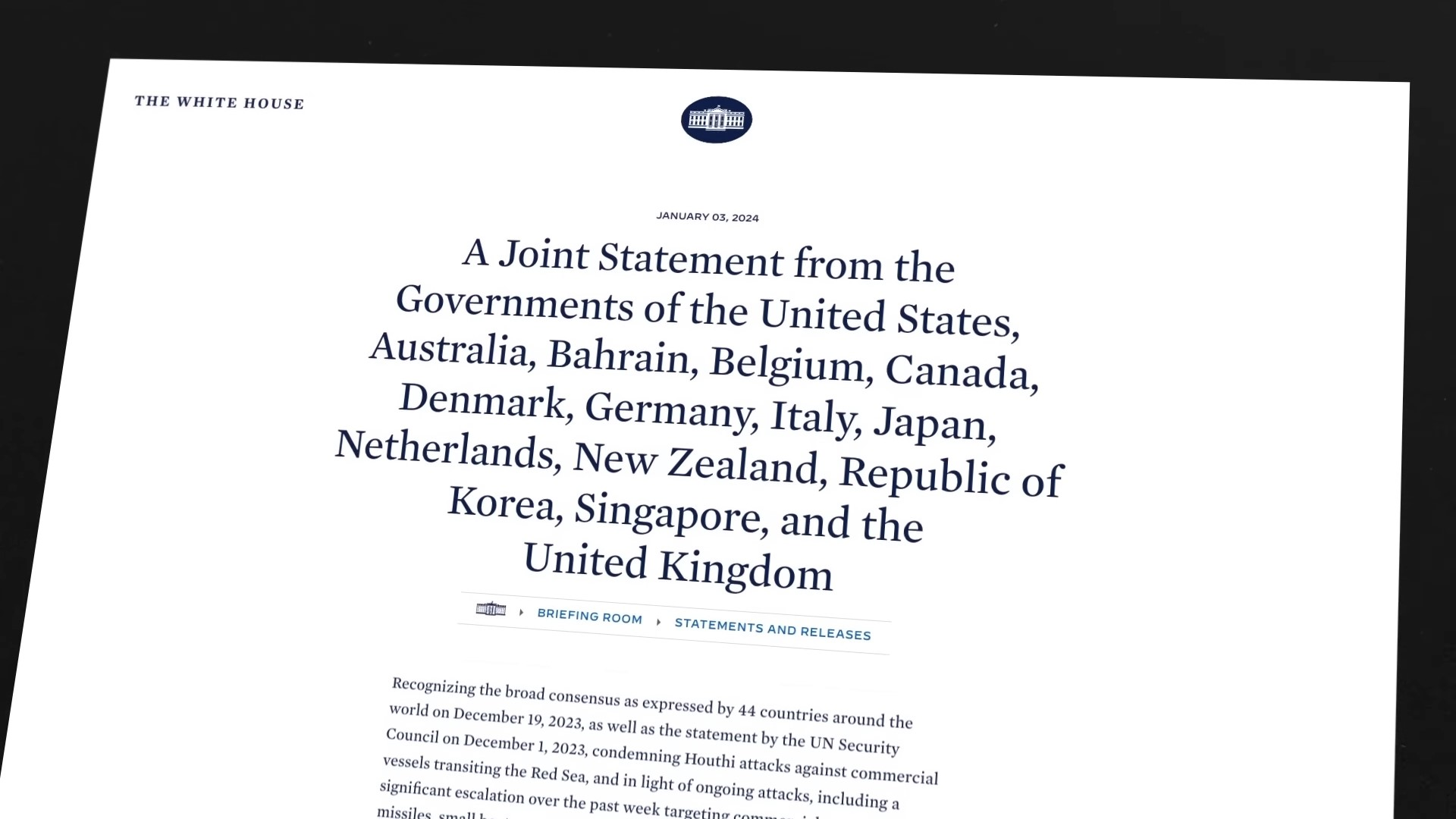
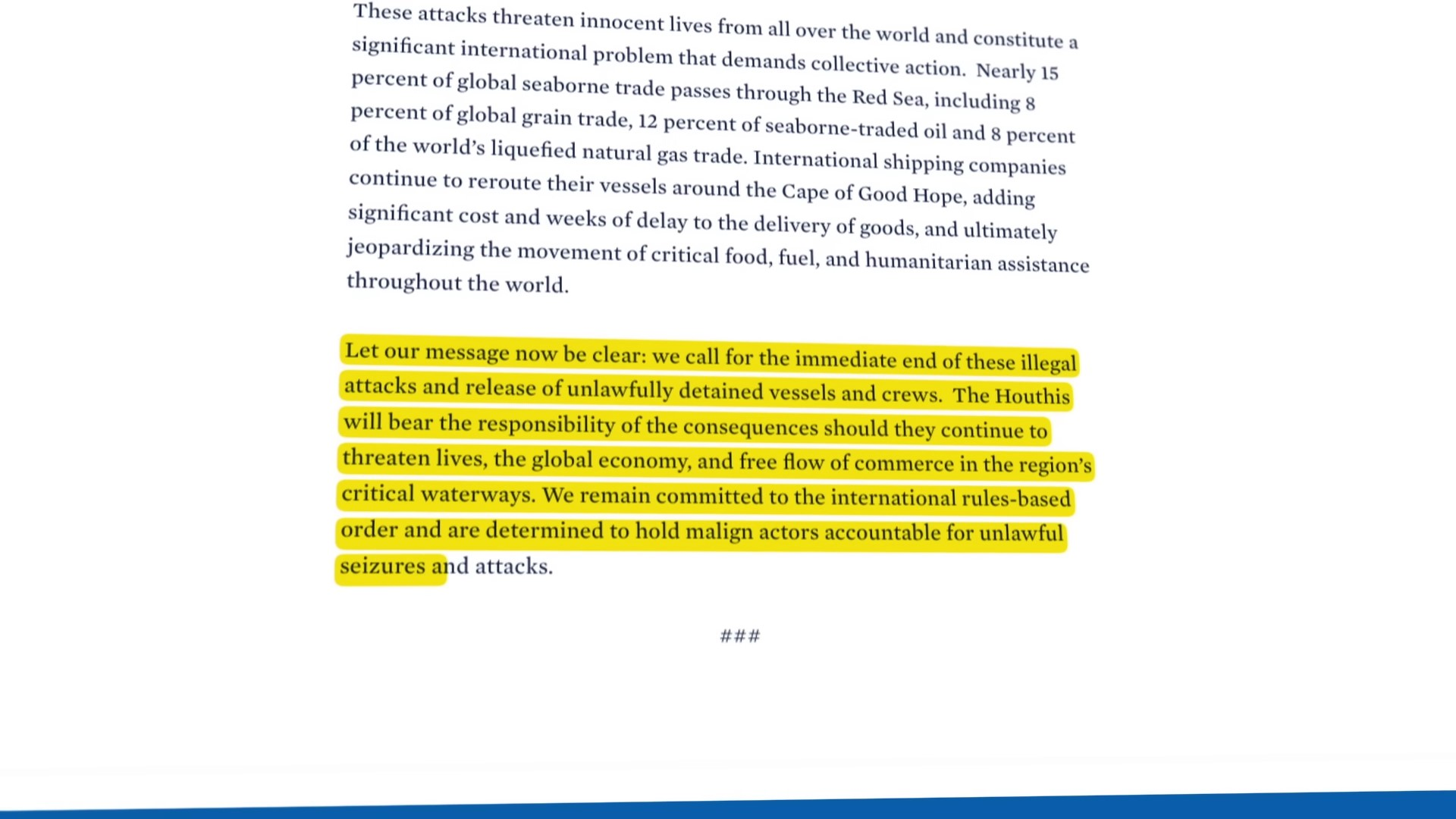
One, America could choose to simply do nothing, letting the Houthi attacks on merchant shipping in the Red Sea continue as long as Israel's war in Gaza continued, and suffer the worldwide negative economic consequences and pressures in a critical presidential election year.
Two, the United States could begin applying tougher pressures on Israel to wind down its war in Gaza, hoping that this might end the Houthi attacks on merchant shipping diplomatically. However, Israel would likely not accept peace unless the pressures from Washington significantly increased, which could strain the U.S.-Israel relationship.
Third, the United States could increase the number of warships deployed to the Red Sea as part of Operation Prosperity Guardian, to escort more merchant vessels and cover a larger area. Many countries, including Australia, have refused to send warships to the Red Sea despite Washington's requests—a significant objection from Washington's perspective.
Challenges in Allocating Warships to the Red Sea | 0:27:40-10:10:10
The United States is facing challenges allocating warships to the Red Sea, due to its focus on maintaining a naval presence in the Western Pacific. The escalating cost of intercepting Iranian drones with expensive missiles could potentially lead to significant costs for the US Defense Department. Options include continuing the current strategy, providing more funding to allies, or launching a risky air campaign against the Houthis in Yemen, which could further escalate tensions with unintended consequences. The effectiveness of bombing the Houthis without addressing the source of their weapons is also questionable.
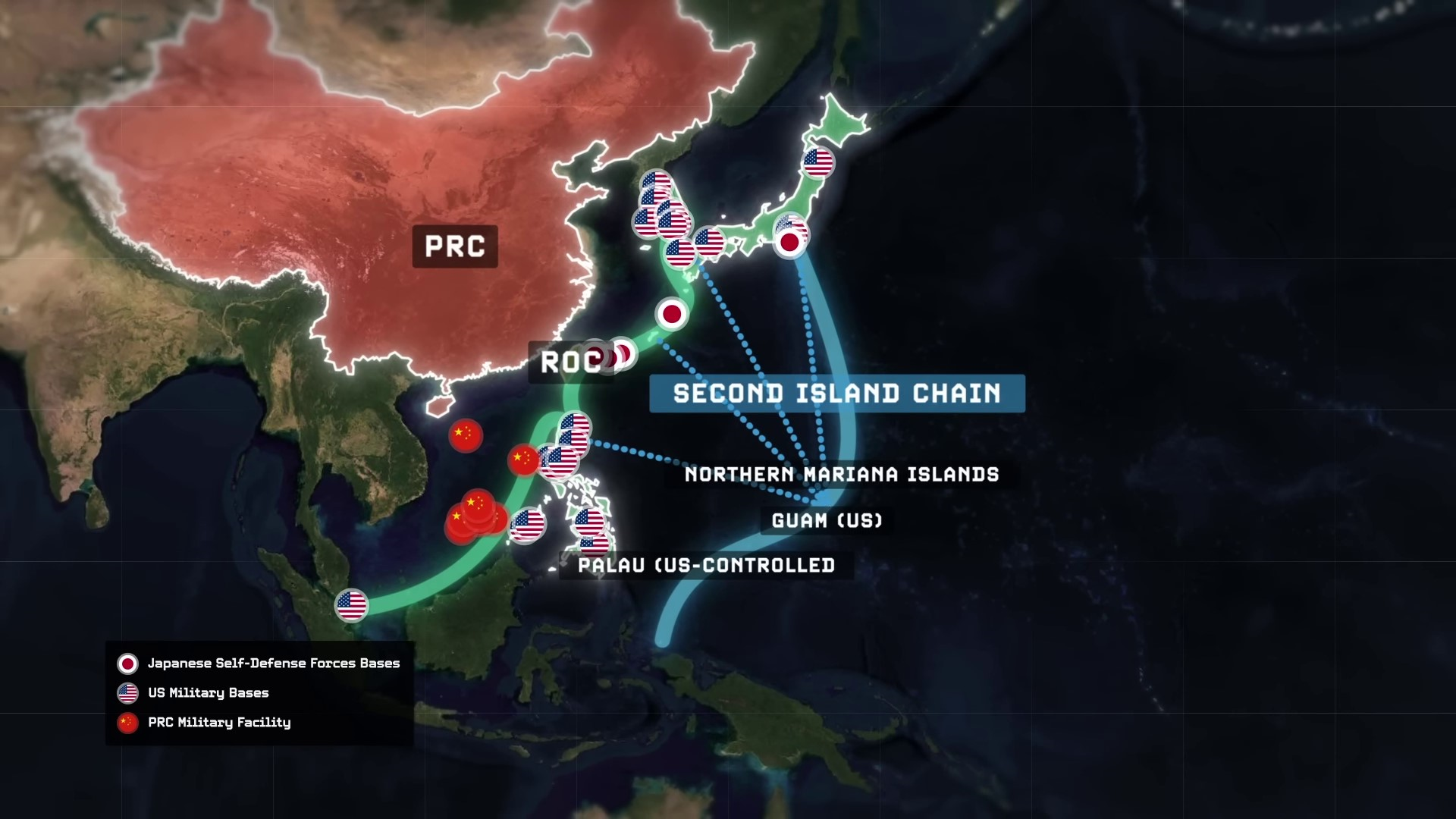
Iran can and likely will continue to send weapons to the Houthis, despite any bombing campaigns started by the United States. However, if America decides to attack Iran's supply lines that run to the Houthis, it risks escalating a US bombing campaign against the Houthis into a direct US-Iran war that both sides undoubtedly want to avoid. In part due to these reasons, the United States might choose to continue with the same cautious approach toward the Houthis they've maintained. This cautious approach is undoubtedly championed by Saudi Arabia.
Since the Biden administration ended America's support for the Saudi intervention in Yemen in 2021, the Saudis have been trying to extricate themselves from their costly war. Peace negotiations between the Saudis and Houthis have been ongoing, with the Saudis reportedly offering concessions, such as allowing more direct flights to open up to the Houthi-controlled capital, easing or ending the ongoing Saudi naval blockade, and most critically, offering to help facilitate payment and salaries of Yemeni public sector employees working within Houthi-controlled territory. But, as American officials in Congress demand the Houthis be re-added to the list of designated terrorist organizations and as the US and British militaries are each considering launching airstrikes, the Saudis are worried their peace negotiations will fall apart.
Both the Iraqi and Iranian militaries began attacking merchant vessels operating across the Persian Gulf with missiles. Iran, in particular, started firing missiles at Kuwaiti oil tankers in retaliation for Kuwait's support and financing of Saddam Hussein's Iraq. In 1986, the US Navy decided to intervene in the conflict and began sending their warships to safely escort Kuwaiti oil tankers through the Gulf and out past the Strait of Hormuz. In 1988, one of these American warships hit an Iranian naval mine within international waters, severely damaging and nearly sinking it. In retaliation, the US Navy launched Operation Praying Mantis within Iran's territorial waters, attacking and sinking five Iranian ships, including a frigate, severely damaging another frigate, and destroying two Iranian offshore oil platforms.
The Biden administration has been reluctant to engage in military action against the Houthis in Yemen in 2024 due to various reasons, including the risk of escalating regional conflicts and Biden's focus on ending America's presence in Middle East wars. There are complex dynamics in the Middle East, i.e., the coverage of the Houthi attacks by news sources and the political bias in reporting. It is important to understand media bias and its impact on politics for constructive dialogue and for challenging assumptions.
